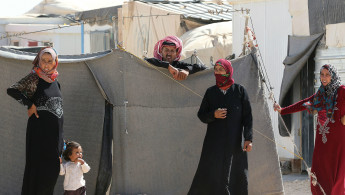Jordan rejects calls to restore access to stranded Syrians
Jordan's King Abdullah II has rejected calls to restore access to a border area where tens of thousands of Syrians are stranded.
Jordan declared the area around the Rukban border crossing a "closed military zone" in June, after a suicide bombing claimed by the Islamic State group killed seven soldiers near a makeshift desert camp where more than 100,000 Syrians are stuck.
This cut off aid access to the Syrians, who have been gathering at the border for months attempting to flee their country's five-year civil war into Jordan.
In comments published by the semi-governmental Addustour newspaper on Monday, the king cited fears of "extremist elements" among those stranded, many of whom come from areas controlled by IS.
"Despite all difficulties, Jordan is doing its utmost to help refugees," he said, "but that will under no circumstances be at the expense of the livelihood of Jordanians and their security."
Aid agencies have pleaded with the government to restore access to the camp and earlier this month Jordan allowed a delivery of desperately needed food and hygiene supplies after an appeal by the United Nations.
But Abdullah said national security was Jordan's top priority.
"We will not allow anyone to put pressure on us," he said.
Abdullah said Jordan was willing to help transfer the Syrians to "any country willing to host them".
Jordan says it is already hosting nearly 1.4 million refugees, of whom 630,000 are registered with the United Nations.
Abdullah said donations from the international community only covered 35 percent of the cost of hosting the refugees, leaving Jordan to make up the shortfall.
That took up more than a quarter of Jordan's budget, he said.
"Jordan is doing its utmost to help refugees," he said. "However, we have reached our limits... This is an international crisis and an international responsibility and the world has to do its part."





 Follow the Middle East's top stories in English at The New Arab on Google News
Follow the Middle East's top stories in English at The New Arab on Google News
![Both Hamas and the Palestinian Authority welcomed the ICC arrest warrants [Getty]](/sites/default/files/styles/image_330x185/public/2024-11/GettyImages-2178351173.jpg?h=199d8c1f&itok=TV858iVg)

